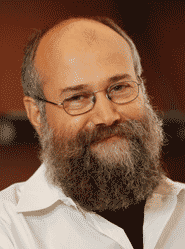Yochai Benkler ’94 marked the occasion of his appointment as the Jack N. and Lillian R. Berkman Professor for Entrepreneurial Legal Studies with a lecture attended by HLS faculty, students, and members of the Berkman family on October 14.
In the lecture—entitled “After Selfishness: Wikipedia 1, Hobbes 0 at Half Time”—Benkler discussed the future of social production. (Watch the webcast)
Introducing Benkler, Dean Elena Kagan ’86 said: “Over the past decade, Yochai has emerged as one of the world’s leading intellectuals of the information age. His studies of the digitally networked world—and how it has changed all our lives—have illuminated, and indeed transformed, our most fundamental understandings of our economy, democracy, and society.”
Benkler joined the HLS faculty in 2007, coming from Yale Law School. He is the acclaimed author of one of the most influential books on the transformative effects of the Internet, “The Wealth of Networks.”
Benkler opened his lecture by posing the question of why social production—the backbone of such phenomena as Wikipedia, Linux and OpenOffice—has proven to be much more than a short-lived fad, and has instead become so pervasive, both on the internet and off-line.
Using examples as wide-ranging as the positive transformation of a once-failing General Motors plant to the dramatic ascension of websites such as YouTube and Digg, Benkler identified structures of motivation evidently more powerful than the principles of scientific management, bureaucratic hierarchy and market incentivization which had characterized systems of production in the earlier part of the twentieth century. He proposed that these structures, properly applied, were at the foundation of each of these “peer production” successes.
Among the features common to these new forms of cooperative systems, Benkler said, are four building blocks that are crucial for success:
• Open communication
• Empathy or humanization of the organization
• Solidarity or a sense of group identity within the organization
• Compatibility with normative concepts of what is right, fair and just
Previous systems, said Benkler, had taken the concept of rigid control over selfishness as the rational starting point upon which everything else could be built. These systems, while successful in their own times, have proven inadequate in today’s ever-accelerating cycles of innovation.
By contrast, collaborative systems, built upon freedom and altruism, benefit from increased individual agency of motivated participants. As such, the newer systems are far more efficient and more capable of adapting to sudden changes. However, the task from the theoretical standpoint, said Benkler, “is to develop a general framework for analyzing human systems of all forms, enabling us to design systems that are both more effective and more resonant with being human.”
The late Jack N. Berkman ’29, chairman of The Associated Group, Inc., was a groundbreaking and immensely successful entrepreneur in the area of communications. His wife, Lillian R. Berkman, was the co-founder of the American Tractor Corporation. Their support enabled Harvard Law School to establish the Berkman Center for Internet and Society and also the Berkman chair.
About the Center and the chair, Myles Berkman has said: “They are, and will be, a reflection and legacy of my Father’s passion for the information age, new technology and the businesses built around them, and the law.”
— Anthony Lux
